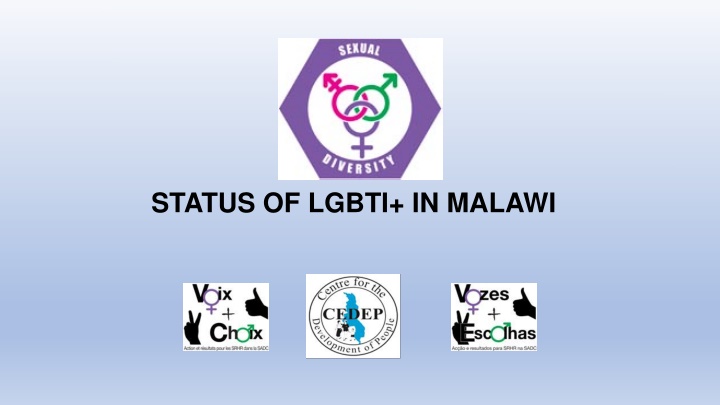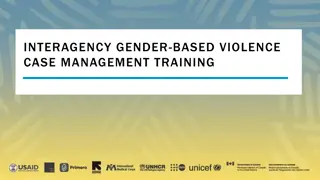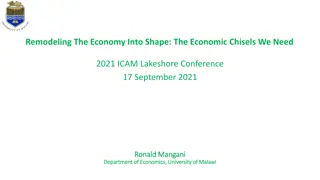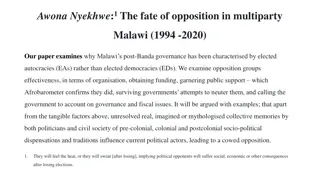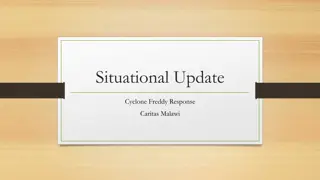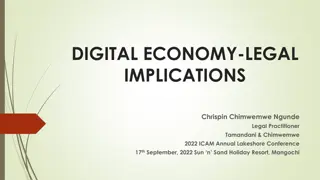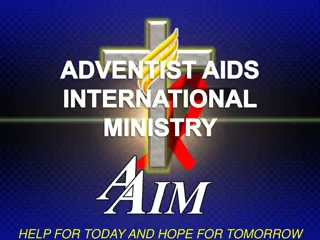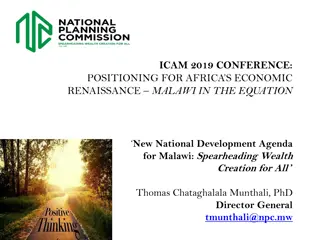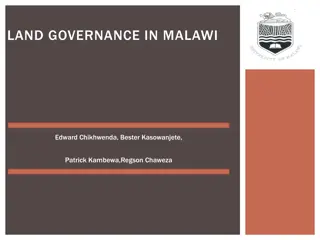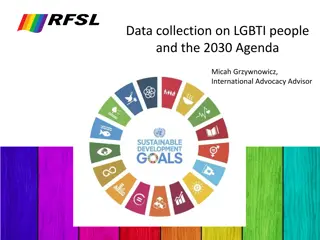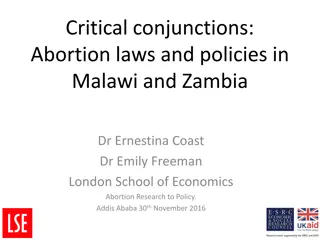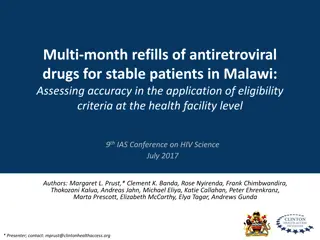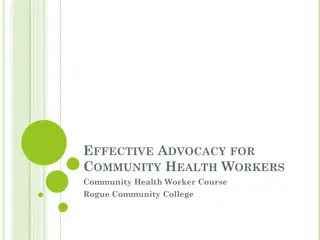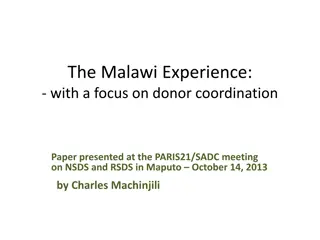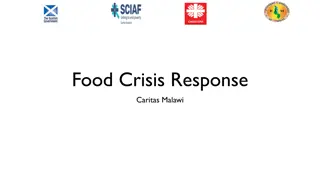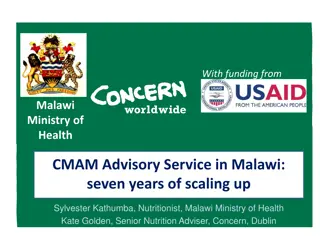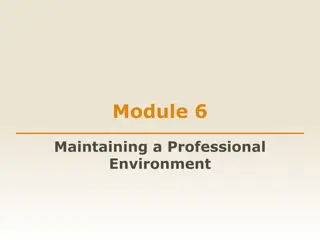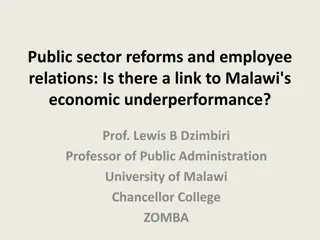Status of LGBTI+ in Malawi - Current Legal Situation and Advocacy Efforts
Despite resistance, LGBTI rights in Malawi remain unsettled with laws criminalizing same-sex relationships. Organizations like CEDEP are advocating for legal reforms to protect LGBTI individuals from violence and discrimination. The campaign for equality includes demands for access to healthcare services and recognition of same-sex marriage.
Download Presentation

Please find below an Image/Link to download the presentation.
The content on the website is provided AS IS for your information and personal use only. It may not be sold, licensed, or shared on other websites without obtaining consent from the author.If you encounter any issues during the download, it is possible that the publisher has removed the file from their server.
You are allowed to download the files provided on this website for personal or commercial use, subject to the condition that they are used lawfully. All files are the property of their respective owners.
The content on the website is provided AS IS for your information and personal use only. It may not be sold, licensed, or shared on other websites without obtaining consent from the author.
E N D
Presentation Transcript
Organisation Profile Organisation Profile Centre for the Development of People ( CEDEP) is a Human Rights organization registered in 2006 and currently operating in 15 districts. Vision: A society that values human diversity and upholds social justice and wellness for all. Mission: To create, an enabling environment and protect the well being of sexual minorities and other vulnerable groups.
Current legal status LGBTI issues remain unsettled in Malawi. Despite some notable changes in the direction of embracing LGBTI rights, there is still widespread resistance. Same sex relationships are illegal in Malawi 1. Penal Code: Intercourseagainst theorderof nature proscribed s.153; Indecentpractices between males s.156 and indecent practices between females s. 137A 2. Marriageact: Definition of sex -The bill defines sex or gender as the sex assigned to a person at birth, denying equal rights to form a family to transgender and intersex persons, and others whose identity does not align with that assigned at birth. 3. Immigration act: Section 4(g) refuses entry to any prostitute or homosexual, or any person, male or female, who lives or has lived on or knowingly receives or has received any part of the earnings of prostitution or homosexuality, or has procured men or women for immoral purposes.
How are the laws implemented? The penal code remains in force despite calls for its amendment where arrest are still being made but which do not enforce the penal code since 2012. The government came up with the moratorium and some religious Leaders obtained an injunction at the High Court against moratorium. Government appealed at the supreme Court. CEDEP and CHRR joined the case as friends of the court Case on Denial of Registration of Rainbow Alliance by Registrar general. Currently there 3 other cases in the court; Kill the gays Case of 2016; The Constitutional case of 2013; The State v Von Gonani Case of 2017. the
What are you demanding? Review of the penal code through the advocacy works that includes : To protect LGBTI persons from violence and ensure that there is prosecution of the perpetrators of violent attacks where CEDEP does document human rights violations based on real or perceived sexual orientation and gender identity which is used as an advocacy tool both at national and international level. LGBTI persons have effective access to health related services, including HIV services. In the long term the process does include advocating for same sex marriage, provisions on changing transgender identities and also same sex couples adopting children ( Malawi does not have any law on same sex couples adopting children).
What is the status of the campaign? There is a positive opportunity to the campaign with the following national policies; 1. National Human Rights Action Plan (NHRAP) 2016-2020 yet to be launched includes a road map to review sodomy laws and also activities to facilitate the implementation of the accepted two recommendations on LGBTI of 2015 Malawi s Universal Periodic Review : To take effective measures to protect LGBTI persons from violence and prosecute the perpetrators of violent attacks; To guarantee that LGBTI persons have effective access to health services, including HIV services. 2. The National Strategic Plan for HIV and Aids (2015 to 2020) includes, in particular, the MSM community, as one portion of the key populations, in order to reach the 90:90:90 goals.
Key stakeholders The Ministry of Justice has always included CEDEP in National Task Force for different international UN reporting mechanism such as; Universal Periodic Report (UPR) Second Cycle-2014, African Protocol of the Rights of Women-2013, International Covenant on Economic Social and Cultural Rights Rights (ICCPR)-2013-2014, Convention on the Elimination of All Forms of Discrimination against Women (CEDAW) - 2015 and the Convention against Torture (CAT). Increased collaboratively with the Ministry of Health through the District Health Offices on MSM and TG HIV testing, Treatment and viral load program that Global Fund is funding through Action Aid. The collaboration with institutions such as Malawi Human Rights Commission (MHRC), and the Malawi Police Service (MPS), contributed to an increased role on the part of MHRC in proactively responding to cases of violations of human rights of sexual minorities, through investigations, as well as the MPS proactive response in cases of attacks against persons of sexual minorities, including through the Victim Support Units (VSUs) and the Malawi Legal Aid Bureau for Pro bono Lawyers. The Media Taskforce for national journalists who have interventions as a national
Coordination There are no specific coordination structures that are used for the advocacy strategies instead, the NGO/ GVT consultative existing structures are used at national level which are; National Taskforce on Regional and International Human Rights Instruments coordinated by the Ministry of Justice in the Human Rights Unit.
LGBTI+ and SRHR Access to SRHR service are through the public hospitals where they are free but due to the legal environment that contributes attitudes, some health service providers do not provide SRHR services to the LGBTI+ communities in Malawi. At CEDEP through the FHI 360 fund in the Linkages Programme has Drop In specifically for the SRHR services targeting the MSM and TGs and use public hospitals as referral points. to the homophobic Centres (4) that are
Key SRHR challenges Intolerant, apathetic or homophobic attitudes against sexual minorities which in turn fuel marginalisation in access to SRHR Service. 1. Religious fundamentalism: Religious fundamentalism remains a major stumbling block. Of late, religious institutions like the Evangelical Association of Malawi Ethics, Peace and Justice Commission have been in the forefront condemning homosexuality and opposing LGBTI rights. The call for respect of the human rights for LGBTI persons has been construed as a call for the legalization of same-sex marriages. 2. Legal barriers: The laws in Malawi (the Penal Code) continue to criminalize consensual same-sex acts. 3. Challenges on the legal reforms: Lack of political commitment by the Government which is comfortable to accommodate the public health approach than the legal reform. There is unclear position on LGBTI issues.
LGBTI+ and SRHR campaigns Using the existing NGO/ government consultation structures for the advocacy. CEDEP has developed and uses its advocacy and communications strategy documents for the campaigns. CEDEP works with allies and key stakeholders at national level.
How can others support? Joint advocacy at regional and international level in the Human Rights instruments. In country learning exchanges on the best practices from other countries that have successes. Organisational capacity building through trainings and support in campaigns / effective advocacy strategies.
